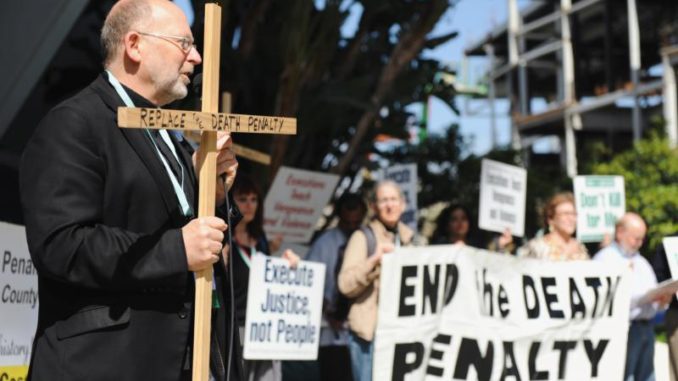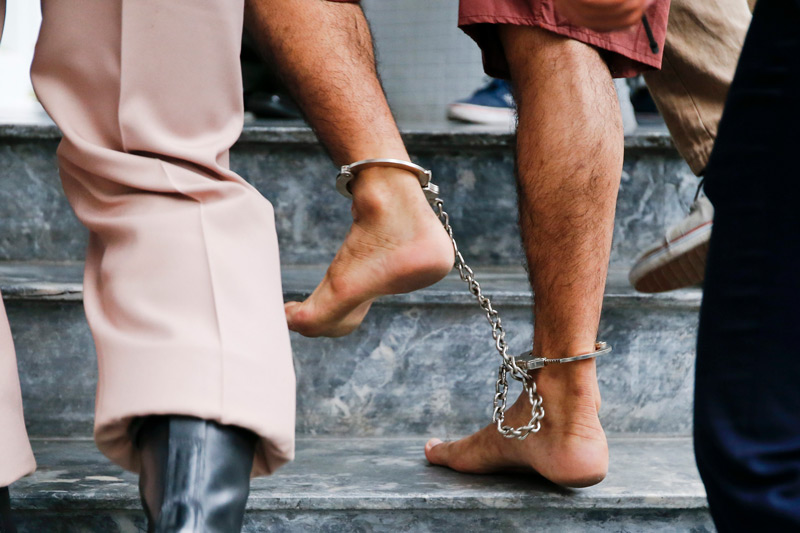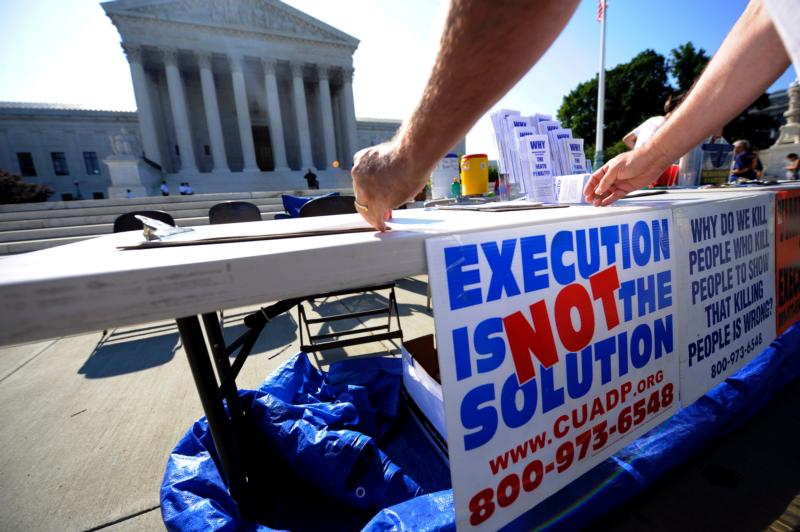
On Tuesday, February 16, the monthly Magnificat magazine featured a message of encouragement and counsel sent to a young man who was about to be ordained a priest. The message mentions to the upcoming-priest that, while he cannot attend, he has access to the rite of ordination and will be following and thus be united with him in spirit as he becomes a priest. The sender of the letter was Servant of God Jacques Fesch, who was writing from a French prison. He, Jacques, talks about how he has been trying to evangelize his atheist father during their visits. He mentions, too, how he has been strengthened by meditating on the Passion of Christ and by his great devotion to the Blessed Mother. What his letter doesn’t reveal is what the closing note offers: Jacques was a convicted murderer who was subsequently executed in 1957.
The potential for a powerful religious conversion and for the Church’s recognition of sanctity may suffice as an argument against capital punishment. If Jacques had been sentenced to life imprisonment instead of the death penalty, he would have had more time to share his own deep faith with his father, to give testimony about his own conversion to fellow prisoners, and simply to provide an example of patient endurance and the possibility of reaching out to others, no matter what one’s personal circumstances might be.
Catholics, and historically Christian nations, have had a mixed history with regard to capital punishment. In August 2018, the Catechism of the Catholic Church was revised to declare an outright condemnation of it. Prefacing the updated passage with remarks on the means now available to prevent crime by “more effective systems of detention” and deterrence of criminals from doing future harm, the current reading of Article 2267 includes this statement: “Consequently, the Church teaches, in the light of the Gospel, that ‘the death penalty is inadmissible because it is an attack on the inviolability and dignity of the person’ and she works with determination for its abolition worldwide.”
As Pope Francis authorized this insertion into the Catechism, Pope St. John Paul II and Pope Benedict XVI were cited for their speaking out against the death penalty and the various times they had attempted to intercede on behalf of those about to be executed. In 1995, when St. John Paul II released “The Gospel of Life,” he had offered the counsel that, in our times, cases warranting the execution of criminals “are very rare, if not practically non-existent.” By January 1999 he was actively denouncing the death penalty.
With Federal prisons escalating executions in late 2020 and state legislators now considering reinstituting means of capital punishment — like the electric chair — we may ask how the Church arrived at this firm opposition to the death penalty. The Catechism admits that it was not always so.
In post-Eden life, Cain was promised by God protection from being killed after his murder of his brother Abel (Genesis 4:14-16). By the time we get to Leviticus, however, we see that laws prescribing restitution and reparation and exile from the community are accompanied by lists of crimes which warrant putting to death. These punishments were seen as protective of coherent and cohesive society. While the early Christians were themselves peacekeepers and peacemakers, they also endured execution by beheading and crucifixion in union with Christ and did not question whether governing officials had the right to order such. Thus, resort to capital punishment passed largely by custom into the Christian community.
However, the U.S. Conference of Catholic Bishops, through Archbishop Paul Coakley, reminded us in August 2020, that while the Old Law prescribed stoning to death for those who committed adultery, Jesus intervened to stop it in the case of the woman caught in adultery (John 8). What is customary ought not be presumed to be right or righteous. We should have learned that from the American experience of slavery.
In the 13th century, St. Thomas Aquinas defended, in his Summa Theologica, the state’s right to execute offenders by citing the Old Testament and Aristotle. The presumption was that it fell to civil authorities to mete out justice on behalf of the common good. Aquinas also opined that those who had committed heinous offenses had surrendered their human dignity and assumed the condition of beasts. He did admit, however, that the Gospel does talk about leaving the weeds among the wheat (Matthew 13:24-30). He also allows that, while capital punishment may be seen as a means of protecting society from dangerous criminals and “medicinal” in preventing the spread of crime, there is also reason to pause and rethink. He renders the opinion that if there is a risk of “more numerous and more grievous sins being committed,” executing criminals then becomes unjust (Summa Theologica II-II, q. 43, a.7).
It can be argued that this latter observation by Aquinas helps to explain why recent popes have become strident in objecting to capital punishment. Human life and human dignity are under assault on many sides.
Terrorism and human trafficking, abortion and euthanasia, racial and ethnic hatred and strife, the development of anti-population weapons, and the attitude of enmity-stoking politics are among those things which constitute numerous and grievous sins. Given the evidence that vengefulness and contempt fuel the demand for capital punishment, people of faith must be concerned that what once was considered protective of the social order is no longer defensible. Rather than protecting the common good, it dehumanizes. Aquinas’ view that perpetrators somehow lost their humanity when they committed grievous crimes is not the teaching of the official Church. All of Christian tradition teaches that grace is ever capable of being recovered. And we apply “The Gospel of Life” to each and all human beings.
Along with their concern for how the death penalty dehumanizes the one sentenced and the ones advocating and executing the sentence, religious leaders, including our popes and bishops, have noted inequities in the penal system. Affluent people with skilled lawyers tend to get reduced sentences or access to multiple appeals. White people who commit crimes equivalent to those committed by non-whites tend to get lighter sentences. Repeated studies, including one recently released from researchers from the U.S. and Canada, highlight ongoing racial disparities in criminal sentences. The authors, presenting their study on behalf of the School of Law of the University of Michigan, could find only one answer to the disparities. It was, put simply, that racial bias enters into what the consequences of crime are.
Our recent popes have argued that there are means of protecting society, preventing crimes, and allowing for the possibility of rehabilitation of criminals. They abhor the inequities of existing systems. They also hope for better means of parlaying what we call “restorative justice,” both while people are imprisoned and if and when some are returned to the community. Whether we speak of the good thief, popularly known as St. Dismas, and his promise of Paradise from the dying Jesus or cite the example of Servant of God Jacques Fesch, now in the pipeline for sainthood, we see examples of how grace and “plentiful redemption” (a favorite phrase of St. Alphonsus Liguori) can work.




